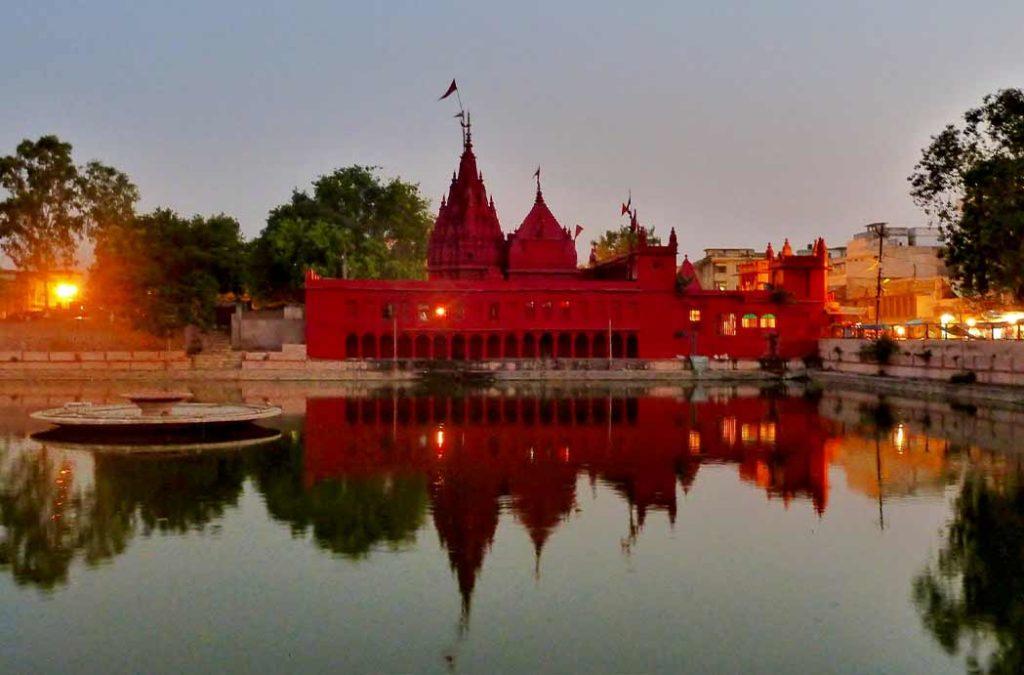Varanasi, also known as Benaras or Kashi, is among the oldest continually inhabited cities in the world and has an unmatched significance in Hindu mythology. English author and literary icon Mark Twain once famously said, “Benaras is older than history, older than tradition, older even than legend, and looks twice as old as all of them put together.” When you’re visiting this historical land, there are several temples in Varanasi that must be on your bucket list.

For countless years, Hindus have revered Varanasi as a sacred city. It is believed that those who are fortunate enough to die in Varanasi will find salvation and be freed from the cycle of rebirth. Varanasi is home to countless temples dedicated to the several gods and goddesses that the city is named after. The Ganges River, which softly winds through the heart of the city and is reputed to have the power to cleanse one’s soul of sins, contributes to the city’s spiritual atmosphere.
Varanasi’s captivating attraction is a result of both its lengthy cultural past and its rich cultural heritage. You can read here about the best things to do in Varanasi to truly understand the city’s rich history and for further knowledge and information.
Markets abound in the city’s narrow, winding streets, offering an intriguing glimpse into daily life for its inhabitants. The famed Ghats, the steps that lead to the sacred river, are crowded with worshippers and seekers engaging in various rites and celebrations at dawn and sunset. Varanasi is a place where spirituality and mysticism embrace, where the cycle of life and death finds deep significance, and where the ancient and the modern cohabit peacefully. Visits to Varanasi are, therefore, memorable experiences that leave a mark on the soul. In this article, we examine a few of this gorgeous sacred land’s most well-known temples.
A Guide To The Must Visit Temples In Varanasi
Varanasi is a land of many temples, some standing since ancient times. Here are some of the most popular and auspicious temples in Varanasi that one needs to see if they visit the holy city.
1. Kashi Vishwanath Temple
Among the many temples in Varanasi that grace the sacred city, the Kashi Vishwanath Temple stands as a true embodiment of spiritual devotion and architectural splendour. Gracefully situated along the banks of the mighty holy river Ganga, the Kashi Vishwanath Temple is one of the most significant places of worship for followers of Lord Shiva. Its status as one of the 12 jyotirlingas, representing the radiant cosmic light of Lord Shiva, draws pilgrims from all corners of the country and beyond.

Stepping inside instantly transports visitors to a realm of tranquillity and piety. The main sanctum houses the sacred Shiva linga, skilfully crafted and adorned with offerings from countless devotees. Intricate carvings, gorgeous domes, and a stunning gold spire that shines in the sunlight combine to create the temple’s breathtaking architecture. Visiting the Kashi Vishwanath Temple is a transformative experience, regardless of whether you’re a devotee.
2. Kaal Bhairav Temple
For those visiting Varanasi, and on a tour of the temples in Varanasi, the Kaal Bhairav Temple is a must-visit. Being one of Varanasi’s oldest temples, dating to the middle of the 17th century, Kaal Bhairav is one of the most revered deities here. For those unaware, Kaal Bhairav is one of the many manifestations of Lord Shiva, only this is one of his most violent manifestations.

The deity, who is depicted wearing a garland of human skulls, is revered as the city’s protector angel, and residents ask his permission before departing Varanasi. As per local mythology, paying homage at this temple will ensure that visitors to Varanasi have a secure stay. All visitors will find the temple to be fascinating and memorable due to its potent aura and historical allure.
3. Durga Kund Temple
In the centre of Varanasi, the Durga Kund Mandir stands as a spectacular homage to Goddess Durga. Its name comes from the rectangular pond (kund) that lies near the temple. With its majestic multi-tiered spire and exquisitely carved red stone construction, this architectural marvel beautifully exemplifies the Nagara style of North India. Built-in the 18th century as a labour of love by a Bengali queen, the temple has since seen worshippers swarming from all over the world.

Legend has it that the idol of Goddess Durga inside the temple miraculously manifested itself without any human involvement, making it a place of immense spiritual importance. As you embark on your journey to Varanasi, this temple should undoubtedly find a spot on your must-visit list.
4. Sankat Mochan Temple
When visiting Varanasi, one must not forget about the Sankat Mochan Hanuman Temple. The poet Goswami Tulsidas built Varanasi’s Sankat Mochan Hanuman Temple in the 16th century, and it has been a respected and well-known destination of worship ever since. The fervent prayers offered here, according to devotees, result in Lord Hanuman’s compassion fulfilling their most heartfelt desires.

The temple is home to amusing monkeys that enhance the spiritual journey and make feeding them really satisfying. A visit ensures a riveting fusion of commitment and enjoyable interactions, making it absolutely special.
5. Shri Vishalakshi Mata Shaktipeeth Temple
Varanasi’s Vishalakshi Temple is yet another popular destination for devotees and tourists alike. This is one of the must-visit temples in Varanasi. A prominent Shaktipeeth, which are holy places of enormous power, the temple dedicated to the Divine Mother exudes a captivating allure. Here, people worship the goddess Vishalakshi, whose name means “the one with large eyes” in Hindi. As per Hindu Mythology, the shrine is where the goddess Sati’s earrings were lost. This temple adds to Varanasi’s spiritual landscape and is a must-visit.

As per Hindu Mythology, the shrine is where the goddess Sati’s earrings were lost. This temple adds to Varanasi’s spiritual landscape and is a must-visit.
6. Annapurna Devi Temple
The Maa Annapurna Temple is undeniably one of the most breathtaking temples in Varanasi. Dedicated to Goddess Annapurna, who is believed to be an incarnation of the revered Hindu Goddess Parvati, this temple is a sacred haven where the divine provider of food is worshipped. At this temple, it is a lovely tradition for worshippers to give food and grains to the poor while sincerely wishing for their long-term happiness and success. The temple is home to two idols of the Goddess, one made of gold and the other of brass.

The gold deity can only be seen on the day before Diwali, also known as Annakut day, but the brass idol can be seen whenever you come. A soul-stirring experience may be had by visiting the Maa Annapurna Temple, where tradition, art, and religion coexist peacefully. All who seek the graces of the benign Goddess Annapurna are left with a lasting impression on their hearts by the temple’s ethereal beauty and the intense devotion found within its walls.
Quick note: When you are on a journey to visit the temples in Varanasi, here is a quick guide to the best and most popular street foods in Varanasi that you must try.
There are scarcely any streets in Varanasi without a temple, and they are all captivating. The ghats and temples in Varanasi are undoubtedly what defines the holy city. However, this sacred city, which beckons you with open arms, has a lot more to offer. So why are you still waiting? Make a trip to Varanasi soon!













